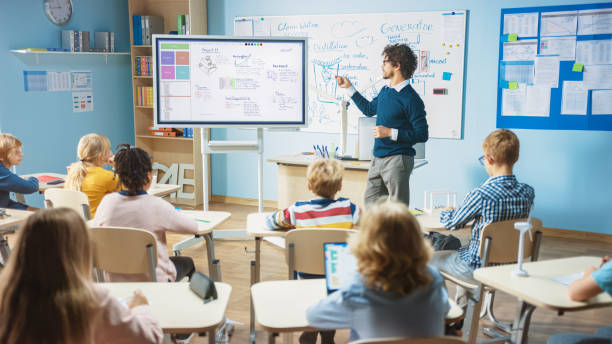Find the Best Primary Science Tuition Singapore for Enhanced Learning
Find the Best Primary Science Tuition Singapore for Enhanced Learning
Blog Article
Discover the Crucial Advantages of Comprehending Primary Science for Young Students
The importance of key scientific research education for young learners extends far past mere understanding procurement; it functions as a fundamental column in establishing important skills such as vital reasoning, analytical, and imagination. Engaging with clinical concepts via interactive and inquiry-based activities not only cultivates inquisitiveness however likewise prepares for durable, confident learners. As we discover these advantages better, it comes to be clear that the implications for future scholastic and personal growth are extensive. What details methods can teachers utilize to take full advantage of these advantages?
Enhancing Crucial Thinking Abilities
Cultivating essential thinking abilities in young students is vital for their cognitive advancement and future academic success. Important reasoning makes it possible for youngsters to analyze details, assess evidence, and make educated choices, which are important abilities in today's information-rich culture. By taking part in scientific inquiry, young learners can enhance these abilities as they explore principles via trial and error, monitoring, and reasoning.
In primary science education and learning, teachers can assist in essential thinking by motivating trainees to ask inquiries, create theories, and conduct experiments. This hands-on strategy permits kids to exercise analytical and establish rational thinking skills. When trainees explore the properties of materials or the principles of activity, they learn to assess their findings critically and attract conclusions based on evidence.
Furthermore, discussions and collaborative tasks can promote vital thinking by providing chances for students to express their ideas, challenge assumptions, and think about varied viewpoints. By producing a supportive atmosphere that values query and representation, educators can nurture vital assuming abilities that equip young learners to come to be independent thinkers and lifelong learners. Eventually, improving these skills lays a durable structure for their future scholastic undertakings and individual growth.
Cultivating Curiosity and Exploration

Primary science education gives an organized setting where young students can explore numerous phenomena via hands-on experiments and observations. By allowing them to engage with materials and participate in inquiry-based discovering, teachers produce chances for youngsters to create theories, check their concepts, and reason. Such experiences nurture a feeling of marvel and excitement concerning scientific research.

Building Self-confidence in Issue Resolving
Building confidence in analytical is a critical component of key scientific research education that encourages young students to approach challenges with resilience and creative thinking - primary science tuition Singapore. When youngsters are urged to involve with scientific principles with hands-on activities and inquiry-based learning, they create necessary abilities in crucial reasoning and evaluation. This process not only boosts their understanding of clinical concepts but additionally promotes a feeling of ownership over their knowing
To construct confidence, educators need to develop a supportive atmosphere where blunders are seen as chances for growth instead than failures. This motivates students to take risks and discover different solutions to problems. By offering scaffolding and advice, teachers can assist trainees navigate complicated tasks, gradually raising their independence in analytic circumstances.
Additionally, collaborative understanding experiences, such as group jobs or experiments, can better improve pupils' self-confidence as they find out to express their ideas and listen to others' perspectives. These communications nurture social abilities and enhance the concept that analytic is frequently a collective venture. Eventually, growing self-confidence in analytic prepares young students for future academic obstacles and furnishes them with the devices needed for long-lasting discovering.
Urging Creativity and Development
In the world of key scientific research education and learning, urging imagination and innovation is crucial for growing a vibrant understanding setting. By promoting a culture where young students can check out ideas and experiment openly, educators aid students establish critical thinking skills and an enthusiasm for discovery. Imagination in science urges kids to ask concerns, devise hypotheses, and take part in hands-on activities that stimulate their creative imagination.
Incorporating my site flexible projects and inquiry-based discovering into the curriculum permits students to share their unique point of views and options. When entrusted with resolving a problem relevant to their atmosphere, students can conceptualize several methods, leading to inventive results that display their originality. This not only grows their understanding of clinical principles but also imparts a feeling of possession over their knowing procedure.
In addition, creative science education nurtures partnership amongst peers, as trainees commonly share ideas and improve each other's understandings - primary science tuition Singapore. This joint spirit advertises not just technology however additionally crucial social abilities. Hence, by focusing on creative thinking and innovation in key scientific research education and learning, we encourage young learners to assume critically, accept obstacles, and picture opportunities, laying a strong foundation for long-lasting discovering and expedition
Planning For Future Learning Difficulties
Young students' capability to navigate future knowing challenges hinges on a strong structure in primary scientific research education and learning. This fundamental understanding outfits students with important believing abilities and a methodical method to analytic, crucial for tackling complex issues in an ever-evolving globe. Key scientific research cultivates inquiry-based understanding, encouraging trainees to ask questions, check out hypotheses, and take part in hands-on experiments.
As they develop these abilities, learners come to be adept at assessing data, identifying patterns, and drawing educated conclusions. Such proficiencies are essential not just in clinical fields yet likewise in math, design, and modern technology (STEM), where interdisciplinary knowledge is significantly vital.
Additionally, primary science education cultivates a feeling of inquisitiveness and durability in young learners, allowing them to see difficulties as opportunities for growth. As they encounter and get rid of obstacles in their clinical explorations, they construct self-confidence in their capacity to adjust and innovate.
Ultimately, a strong structure in primary science not just prepares young students for scholastic searches yet likewise furnishes them with the tools essential for lifelong learning and flexibility in a quickly altering global landscape. By investing in main science education and learning, we are purchasing helpful resources the future possibility of our students.
Verdict
Comprehending main science is important for young learners, as it cultivates critical thinking, inquisitiveness, and creative thinking. Eventually, the benefits of primary scientific research education prepare children for future academic pursuits and instill lifelong learning behaviors find here vital for prospering in an ever-evolving globe.
The relevance of primary scientific research education and learning for young learners extends far past simple knowledge purchase; it serves as a fundamental pillar in creating vital skills such as critical thinking, problem-solving, and imagination. By creating a helpful setting that values questions and representation, instructors can support essential believing skills that empower young learners to end up being independent thinkers and long-lasting students. Hence, by focusing on creativity and development in key science education and learning, we encourage young students to believe seriously, embrace challenges, and visualize possibilities, laying a solid foundation for lifelong discovering and expedition.
Young learners' ability to browse future understanding obstacles hinges on a solid foundation in main scientific research education.Understanding main scientific research is important for young learners, as it promotes critical reasoning, inquisitiveness, and creative thinking.
Report this page